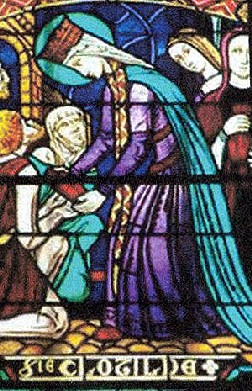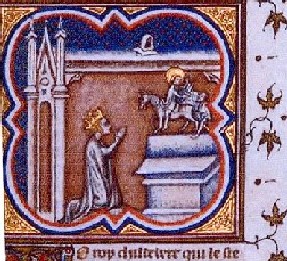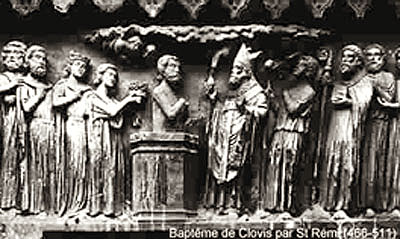 |
The Saint of the Day
St. Clotilda, June 3
Prof. Plinio Corrêa de Oliveira
Biographical selection:

St. Clotilda distributing alms.
Her example converted her Clovis
|
St. Clotilda was Queen of France, daughter of King Chilperic, and wife of King Clovis. It was due to her prayers that France received the gift of the Catholic Faith. She was glorified by an outstanding spiritual motherhood, because on a Christmas Eve, from the baptismal fountain of Rheims, was born the primogenital nation of the Church.
The violent death of her father Chilperic, dethroned by a fratricidal usurper; the sight of her brothers massacred, and of her mother drowned in the Rhone; her long captivity in the Arian court of the murderer who brought heresy with him to the throne of the Burgundians, developed in her the heroism that was to make this niece of Gondebaud become the mother of the whole nation to Christ.
Comments of Prof. Plinio:
This selection is not very clear. Let me try to straighten up the historical facts.
St. Clotilda was the daughter of the Burgundian King Chilperic. Her father was Catholic and his brother, her uncle Gondebaud, was Arian. Arianism was a terrible heresy that infested the Church for several centuries. Her Arian uncle killed her father along with a great part of her family. Her mother was drowned in the Rhone River, her brothers massacred, etc. I have never read why the uncle did not kill St. Clotilda also. But he took her to his castle and kept her as a second-class princess - half-free, half-prisoner.
Clovis was the King of the Franks and neighbor of the Burgundians. He realized that the murdered father of Clotilda still had many Catholic supporters and was planning to further divide the Burgundian kingdom to make it easier to be conquered. Toward this end, he asked Clotilda to marry him. It is hard to understand why the king accepted, given the political inconvenience that could come from the union, but he did.

St. Clotilda prays for Clovis,
who wins the Battle of Tolbiac and converts
|
Before they married, however, St. Clotilda received from Clovis his promise to respect her Catholic faith. So St. Clotilda accepted, and with this she escaped her uncle’s captivity and the Arian atmosphere of his court. She became the queen of a barbarian and pagan nation. She continued to practice her faith, and Clovis was influenced by her example.
When he was in a very difficult military situation, on the point of losing the battle of Tolbiac against the Alamanni barbarians in the year 496, he made a promise to “the God of Clotilda.” He promised that if God would help to win that battle, he would convert to the Catholic Faith. God helped him and he won; afterwards he converted.
At the time St. Remigius was Bishop of Rheims and exercised great influence over St. Clotilda. He prepared Clovis for Baptism. On Christmas Eve of 496 the barbarian was baptized by the Saint in the Cathedral of Rheims.

The Baptism of Clovis, a relief on the walls of Rheims Cathedral
|
A good tradition affirms that at the moment of the Baptism of Clovis, a dove came from Heaven carrying in its beak an ampulla with sacred oil that St. Remigius used to consecrate him as the first King of France. Thenceforth the same oil was used to consecrate all of the Kings of France in their coronation ceremony. This tradition was maintained until the coronation of Louis XVI. During the French Revolution the ampulla with the oil disappeared.
On that same Christmas day the most important chiefs of the Frankish people converted with Clovis. It was the first nation as such that converted to the Catholic Faith.
It is said that on the day of the Baptism of the Franks, an Angel brought St. Clotilda the new banner of the Franks. Before, the banner had three frogs on it; now it had three fleurs-de-lis. Christmas 496 is considered in History the milestone that marks the beginning of the Middle Ages. Therefore, St. Clotilda had this very beautiful vocation.
Beautiful vocations like hers are often born from the worse storms and disasters. They are born from great sufferings, tragedies, deceptions, contradictions and incomprehensible situations. It is like the cactus, which is an ugly plant that is laden with thorns, but produces a wonderful flower. At the end of the long road of sufferings, the vocation blooms, bringing forth its full beauty.
In such souls, it becomes clear that the success of these vocations does not rely simply on human merit. They are due to the will and action of God, which comes to us through the universal intercession of Our Lady.
St. Clotilda, whose example and prayers converted Clovis and the Franks and gave the start to Christendom, is a great patroness for us who long for the Reign of Mary. We should ask her to give us the necessary spirit to start to effectively build the new glorious era for the Church and Our Lady.

Posted June 1, 2004

  | | Prof. Plinio Corrêa de Oliveira | |
The Saint of the Day features highlights from the lives of saints based on comments made by the late Prof. Plinio Corrêa de Oliveira. Following the example of St. John Bosco who used to make similar talks for the boys of his College, each evening it was Prof. Plinio’s custom to make a short commentary on the lives of the next day’s saint in a meeting for youth in order to encourage them in the practice of virtue and love for the Catholic Church. TIA thought that its readers could profit from these valuable commentaries.
The texts of both the biographical data and the comments come from personal notes taken by Atila S. Guimarães from 1964 to 1995. Given the fact that the source is a personal notebook, it is possible that at times the biographic notes transcribed here will not rigorously follow the original text read by Prof. Plinio. The commentaries have also been adapted and translated for TIA’s site.
|
Saint of the Day | Home | Books | CDs | Search | Contact Us | Donate

© 2002- Tradition in Action, Inc. All Rights Reserved
|
 |

|